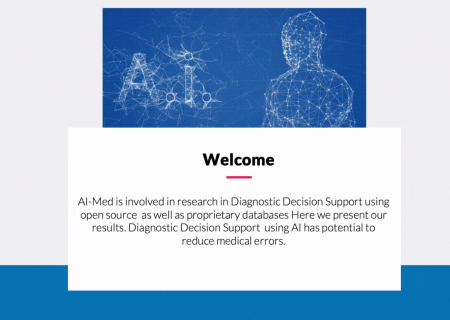Breakthroughs in Artificial Intelligence
for Medical Diagnosis.
Where AI meets Medicine to leverage Smarter Medical Decisions & eventually save lives when it matters.
For Doctors
For Hospitals
For Corporates

AI-MED proudly introduces

PAIRS ( Phyisican Assistant Artificial Intelligence System)
An Ingenious & State of the Art Clinical Decision Support System (CDSS)
Difficult to Diagnosis Cases
Useful to provide multi-functional & quick suggestions for probable diagnosis of difficult cases.
Vast Medical Database
Built over a period of 3 decades. Clinical reports published (70K PUBMED cases) as evidence of accuracy.
Prevent Misdiagnosis
We help Doctors & Medical Professionals in diagnosis by pathophysiological reasoning.
Reduce Time taken for Diagnosis
Doctors can validate their probable diagnosis faster with PAIRS instead of spending hours trying to search online or read through medical journals & books.

How It Works
Using a variety of parameters, AI-MED assists you in verifying your diagnosis.
28,000
Disease-Features
486
Internal Medicine
Diseases
2000
Medical
Features

How is Pairs relevant to you ?
Difficult Cases
Some internal medicine cases in domain of connective tissue disorders or autoimmune diseases have multiple organ involvement. These cases are difficult to diagnose.
Identify Patient Data
User choice for easy identification and entry of patient data.
Automated dropdown listing. Natural Language Processor identifies patient data by using a SNOMED-CT algorithm.
Automated dropdown listing. Natural Language Processor identifies patient data by using a SNOMED-CT algorithm.
Diagnostic Algorithms
Bayesian probabilistic belief networks are commonly used in artificial intelligence. Direct application of these for medical diagnosis is difficult. Alternative solution is an approx method which is implemented in PAIRS.
Miss or Missed Diagnosis
Errors in medical practice are common and are catastrophic to both patient and doctor. This can be prevented by use of Clinical Decision Support Systems (CDSS).
Patient Data Entry
Completing patient data entry involves identification of corresponding features in PAIRS database. This involves use of NLP for similar or related features, acronyms. Good case building helps diagnosis.
Diagnostic Probability
User identifies either infection, neoplasia, autoimmune or others as expected disease process. Based on this PAIRS gives diagnosis from top 25 possibilities. It also suggests investigations for them
PAIRS Advantage
Compellingly expedite business leadership via backend resources. Globally morph backward-compatible leadership skills.
Get Started !
Contact Us
